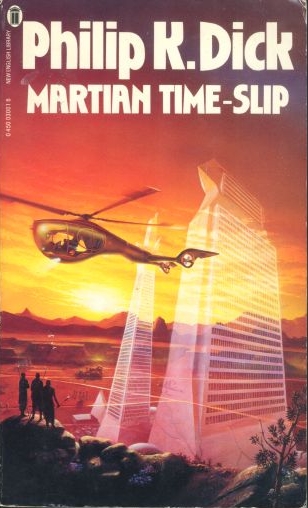 |
|
Yesterday's SF is today's alternate history. |
|
|
|
Handbasket Reading for 2K3
The Agony Column for February 25, 2003
Commentary by Rick Kleffel
If, as Carlyle Thompson says, the world is going to hell in a handbasket, at least there's going to be some good science fiction reading for the ride. I've been gathering titles for well over a month now, and I know I'll miss out on some favorites. But the reading landscape for the year ahead is filled with wonderful anticipation. Old favorites from last year, new discoveries from last year, the warhorse authors with their latest wares -- you'll need to read fast to keep up with what's already been released, let alone what's coming forth. Some of this list is leftovers from the end of last year, some stuff you won't see for months or at all in the blighted world of US publishing. You'll discover some new writers this year, I guarantee it. For me, that's the best reading experience you can find.
 |
|
Yesterday's SF is today's alternate history. |
We're now living in the future that had been portrayed by lots of classic science fiction. Well, at least temporally if not scientifically or sociologically. The back cover blurb from Philip K. Dick's wonderful 'Martian Time Slip' reads:
"Mars in the 1990s is fast becoming Earth's most neglected colony. Short of water and no more than marginally suitable for settlement in the first place, it had always been a struggle to attract emigrants from Earth."
What, are we talking about California here? Science fiction has always been primarily about the future. But there's no reason --especially now, when we're living in the future -- that science fiction can't be about the present or the past. I'm not just alking about cheesy bestselling thrillers here, though they do have a marginal SFnal content. It's now possible to talk about why the technologies we hoped to exist today don't exist. Had it been written in the 1970's 'The Corrections' would have been a science fiction novel. Writers are beginning to address the fact that we're living the future. It's just not the future we had hoped for, planned for or dreamed. We've passed many of the most iconic dates -- 1984 is nostalgia fodder, and 2001 is obliterated in the fall of the monoliths. There's no reason that SF writers can't get back to the past, and look for fictional science there as easily as the future. Horror writers have been concealing apocalyptic phantasmagoria in the past and present for 200 years. Why can't SF writers do the same? What did happen to my goddamned flying car? Did the NRA shitcan the our phasers? I want answers -- in science fiction.
 |
|
Carter Scholz writes fiction about the science of the recent past that is not alternate history in 'Radiance'. |
I'm currently in the process of discovering a new writer for this year from a book I picked up last year. That would be Carter Scholz's 'Radiance', which just came out as a trade paperback last week. 'Radiance' might look a bit like a tough nut to crack, but it is a very smooth and easy read. Now, perhaps I'm one of the ultra-small niche audience for this novel. I actually know two people who have worked in the clearance-required end of the aerospace and defense industry, and both worked on a project that was very similar to the nuclear-powered, space-based laser array of 'Radiance'. But Scholz's novel is a fascinating take on fictional science. Set over ten years ago in the days shortly before the Internet wind-up, 'Radiance' captures the rhythms of speech and working in any high-tech, high-pressure environment. It's funny and a bit surreal, with a wistful undertone. It's also rather amazing how the backdated subject now seems very -- presciently -- applicable. By writing about science fiction that takes place in the past, Scholz gets to have his vision of the future as it is entrenched in the past. I suspect that this model of science fiction will become much more common in the following years, as the world of our past becomes more and more the future not foreseen in science fiction decades ago.
 |
|
In 'The Amount to Carry' Carter Scholz gets deep into Calvino territory with stories about historic literary figures and hysterical science fiction editors. |
Scholz's latest release is 'The Amount to Carry', a collection of short stories that even drew the attention of San Francisco Chronicle Book Review editor David Kipen. Kipen's not a reader of science fiction, but he allows himself the pleasures of Scholz's collection. I find it fascinating that Scholz published just about every story in a genre publication, and yet, looking at the collection and the marketing material associated with it, one would never know. With 'Radiance' and 'The Amount to Carry', Scholz may be joining William Gibson in a redefinition and expansion of the science fiction genre. Or maybe it's just a blur.
 |
|
William Gibson views the present with the eye of a science fiction writer who helped invent -- or prevent it in 'Pattern Recognition'. |
Gibson's latest has been out for a couple of weeks now and both my wife and Jan have read and enjoyed 'Pattern Recognition'. I was shocked to find out that it's a national bestseller. The present as seen by a futurist, 'Pattern Recognition' incorporates Fortean 'Wild Talents' into a tale of corporate and national intrigue. It also looks to incorporate a bit of humor, given that the protagonist in this forward-looking new novel is named Cayce. When I was a kid and first started buying books, I was always rather afraid of the books by noted psychic (and by definition, 'futurist') Edgar Cayce. I'm actually not afraid of this Cayce. I'm looking forward to forward looking.
 |
|
Bruce Sterling returns to non-fiction with his futurological exploration 'Tomorrow Now'. |
Bruce Sterling rounds out the trio of authors who are moving into science fiction's growth industry -- writing about the present as if it is a science fictional future, because for some of us brought up on science fiction in the 1960's and 1970's this is the future, just not the future foreseen by the writers we loved. Sterling returns to non-fiction with 'Tomorrow Now'. Sterling's other non-fiction work, 'The Hacker Crackdown' came ten years ago, and was a trenchant look at the unintended consequences of the breakup of AT&T and the birth of what would become the Internet. His new work is the kind of futurist vision once offered only by Sir Arthur C. Clarke. Before Clarke collaborated with Stanley Kubrick to turn the world of science fiction film on its head, he invented the communications satellite in a work not vastly different than this one by Sterling. While many science fiction writers seem to write their fiction solely to prevent their visions from becoming a reality, Sterling offers non-fictional speculations that he sees as having the potential to become reality. Sterling definitely has had a finger in the future for a number of years. But most importantly, Sterling's a lot of fun to read. Whether or not his predictions come to pass is less important than the thoughts created in the readers' minds by Sterling's synapse-firing prose.
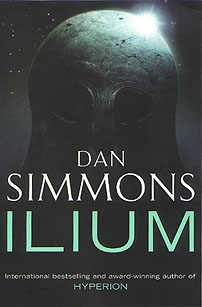 |
|
The odds-on favorite to receive the Hugo award for the best novel of 2003. If 'Hyperion' is done well as a movie, Simmons may grow wings and ascend gently to heaven. |
One of the event novels of this year is most assuredly going to be Dan Simmons' 'Ilium'. It's the first of two parts, to be followed by 'Olympus'. Set in the universe of his story 'The Ninth of Av', collected in 'Worlds Enough and Time', 'Ilium' will be coming out in a limited edition from Subterranean Press. Add to this the impending announcement of movie plans for 'Hyperion'. Simmons hinted that a dream-producer would be involved in a book tour last year. With a double whammy of book and movie, Simmons may finally allow himself to achieve the high profile he's evaded with his genre-shifting strategy. He's an excellent speaker and consummate showman. There's little doubt that 'Ilium' will be on a lot of reading lists, a lot of year's best lists and a lot of award ballots.
 |
|
Cory Doctorow's left coast Unixified novel 'Down and Out in the Magic Kingdom is positive bubbling with ideas. |
Readers should have been looking forward to Cory Doctorow's 'Down and Out in the Magic Kingdom'. It's just been released, and it's a welcome hoot from the left-coast Unix world of intriguing ideas couched in good-old goofy fun. Set in the post-Bitchun Society, where death and scarcity are things of the past, 'Down and Out in the Magic Kingdom' is a quick romp through a gaggle of post-doc theses dancing to a Disney beat. Turn a page and another new idea jostles for your attention with a belly laugh. Doctorow's not your typical grim cyberpunk, though he pays homage to Stephenson. Doctorow's protagonist, Jules lives in a utopia that we can actually cheer for even if it treats him unkindly. This novel is easy reading but leaves a delightful mix of ideas and jokes whirling in the reader's brain long after the book is finished. It has more in common with the 'Pirx the Pilot' tales of Stanislaw Lem than it does with William Gibson -- of the past or present at least.
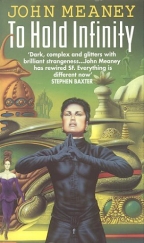 |
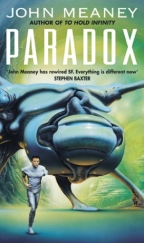 |
|
John Meaney's 'To Hold Infinity' is still available in first edition UK mass market paperback. |
In 'Paradox', John meaney creates a society based around an oracular elite. |
One author you're not likely to see published in the US is John Meaney. I can't explain why this would happen. Meaney's one of the most exciting pure-SF writers to come down the pike in a long time, but he's not been given publication in the US yet, even though the UK arm of Ballantine books publishes his newest novels in hardcover first editions. His first novel, the paperback original 'To Hold Infinity' came out in 1998. It's a rock-solid SF mystery set in a society on the verge of singularity. He followed this up in 2000 with 'Paradox', set far the same universe but far in the future from the first novel. Most of the inhabitants of the world of Nulaperion live underground in a society literally stratified. From the lower reaches comes Tom Corcoran, who in an instant of observation is transformed from grist for the mill into noble hero fighting for freedom.
 |
|
Jim Burns' cover graces the new novel 'Context' by John Meaney. |
Meaney's prose talents are great. Readers who enjoy the work of Dan Simmons, for example, would be well advised to seek out this new writer while waiting for the July release of Simmons' novel. Like Simmons, Meaney creates a world you can feel, smell, and hear, a world on the wavefront of the reader's ability to comprehend. Even before you've finished reading his first two novels in paperback, you'll be ordering his newest in hardcover, 'Context', which takes up where 'Paradox' left off. The only paradox readers will be left with is how US publishers missed their chance to sell this book to those who would surely buy and enjoy it.
 |
|
The Dragon Delasangre is still pining for some feminine company in 'Dragon Moon'. |
OK, it's not science fiction, exactly, and there are lots of titles I'm leaving out because they're not science fiction. But Alan F. Troop's 'The Dragon Delasangre' (reviewed by Katie Dean) was one of those little books that came in under the radar last year and was a lot more delightful than it had any right to be. So count me in for 'Dragon Moon', his sequel, in which the Dragon Delasangre continues to look for love and tries keep the body count low. Troop's were-dragons were pretty damn entertaining, and I'm hoping he'll flesh out many of the more interesting bits of history that the series offers in potential. Troop brought home this novel with a very nicely written first-person voice. That in itself would bring me back. Good writing has a way of doing that, as do those unexpected discoveries.
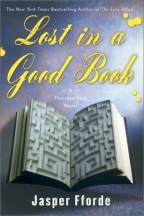 |
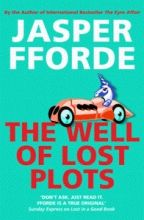 |
|
The covers of the US editions of the Fforde books are excellent exercises in good literary taste... |
...But I prefer Fforde's more goofy UK covers. |
One of the great unexpected discoveries of the past couple of years had to be Jasper Fforde whose 'The Eyre Affair' and 'Lost in a Good Book' were two of the most enjoyable reads I've had in a long time. Fforde manages to combine erudition, boatloads of research and witty very literary satire into one very nice package. US readers are about to get a gander at 'Lost in a Good Book', and some will be able to see him on an upcoming book tour. If you have any way to make it to one of his appearances, be sure to do so. He's extemely funny and enjoyable to see; one of those "should have his own talk show" guys. His appearances are also a chance to get all sort of cool little postcards and whatnots. Be sure to buy 'The Well of Lost Plots' from one of the vendors selling signed editions, and if ever there was a time to buy two copies, Fforde is the time.
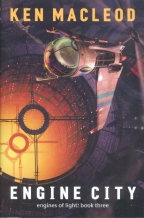 |
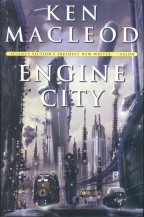 |
|
The UK edition of Ken Macleod's new novel 'Engine City' came out last year. |
Tor found some really nice cover art for the US edition of Macleod's latest. |
Already available in stores is Ken Macleod's 'Engine City', whose release in the UK and the US straddled the year-barrier. Small matter, because Macleod's utterly unique take on science fiction offers the succinct conclusion to a succinct trilogy, including 'Cosmonaut Keep' and 'Dark Light', that in total uses up fewer pages than single entries in other SF writers' series. Things are looking grim in Macleod's universe, but no matter how depressing the outcome may be -- and I have yet to read this book, so I don't know -- Macleod is going to get there in his own inimitable and enjoyable style. More than most writers, Macleod's writing has a singular vibe that in Macleod's case I'd suggest is best described as Socialist Scottish Systems-Admin Satiric SF. But like the best satirists, Macleod takes his creation very seriously in that he creates his world with a complete consistency. There are so many allusions and illusions and delusions treated, trimmed and mixed by a cut-and-paste master DJ of science fiction memes, that Macleod's fiction unfolds gracefully into and out of itself. It's not for everyone. But those for whom it strikes a chord feel the ringing for a long damn enjoyable time.
One of the big bits of science fiction news for this year is the launch of Tor UK, which takes on the editorial content of Pan Millennium. Tor UK is operating under a different bit of management than Tor US. The great news here is that there's going to be a lot of cross fertilization, and the end result is that US readers might see more than a few titles stateside than they might have without the new house. The SF authors coming out of Tor UK are impressive, including Neal Asher and Justina Robson.
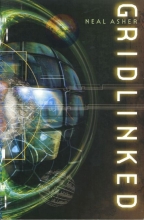 |
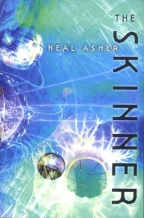 |
|
In 'Gridlinked', Asher introduced Ian Cormac. |
'The Skinner' featured one of the most aggressive ecologies since David Gerrold's 'War against the Chtorr' novels. |
Any science fiction readers looking for a good time need look no farther than Neal Asher. His 2001 novel, 'Gridlinked' was an iron fist sans glove. He created a multitude of hazardous alien environments, a pleasingly intricate but deadly future, and a small army of characters who grew on readers having too much fun reading to notice the great skill involved in Asher's writing. Last year's 'The Skinner' was one of my favorites. It was convoluted but clear, funny, charming, yet extremely violent and awash in imaginatively horrific gore. Now it's a featured paperback in the UK, with its own stand and point-of-sales display. That kind of confidence in Asher's ability is well deserved.
 |
|
Asher's latest novel find Ian Cormac in a world even more hostile than 'The Skinner's Spatterjay. |
Somewhere in all this fun writing, Asher strikes a serene balance that's extremely satisfying to the reader. Step back and get ready to rock as Asher brings back 'Gridlinked's Ian Cormac for another assignment. 'The Line of Polity' is about as much fun as the reader can possibly hope to handle. Once again, Asher effortlessly whisks us off to alien planets teeming with strange lifeforms, each more hazardous than the last. The pleasure that readers feel when they first encounter Asher's fecund creativity will remind them of their first encounter with Philip K. Dick. Like Philip K. Dick, Asher uses his wild imagination to examine some interesting philosophical issues as well entertain the reader's thirst for weirdness. But more than Dick, Asher manages to create characters who get under the reader's skin. In 'The Line of Polity', no reader will forget Apis Coolant, the hard-vacuum adapted human teenager who escapes from a disintegrating space station. Asher packs enough grace notes with his characters to complete a symphony, and indeed there is something symphonic about his novels. They're one big blast in any measure. I'd suggest readers order their copies of Asher's latest early. US readers will have a chance to discover Asher later this year, when Tor US releases 'Gridlinked' as a domestic title.
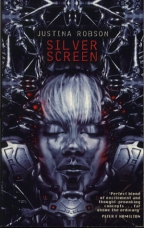 |
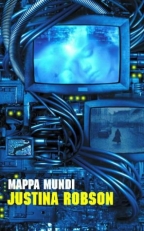 |
|
'Silver Scream' combines elements of cyberpunk with the feel of British mystery. |
'Mappa Mundi' is a paranoid conspiracy thriller shot through with speculations about identity. |
Justina Robson is an intriguing UK author who has two very interesting titles to her name. 'Silver Screen', her first novel has some elements of cyberpunk, but it also has some elements of the genteel British mystery, as well as a much smoother transition from our world into her world of cybernetic enhancement. 'Mappa Mundi', her second novel is a thriller based around mind-control nanotechnology. At its heart the idea of identity as a fluid, living thing forms a philosophical kernel around which Robson bases her novel.
 |
|
The latest novel by Justina Robson, the space opera 'Natural History' is a departure from her near-future speculations. |
Her newest novel is 'Natural History', a space opera set in a future when ordinary humans share the world and the solar system with the Augmented, highly adapted humans who are able to live in extreme environments. This is an eagerly awaited development, as Robson is very good at bringing the weirder elements of science fiction well within the reader's astonished view. I'm hoping to get an advance look at this before it comes out -- and if I do, you can look here for the review.
 |
|
Get ready to rock hard in Richard Morgan's 'Broken Angels', a novel that will exceed many readers' expectations. |
Richard Morgan's 'Altered Carbon' was one of the most stirring releases of last year. It absolutely rocked out of the gate. Not surprisingly, one of the most highly anticipated titles of this year is certainly 'Broken Angels'. It's well worth the wait. Once again, Morgan treats the readers to a red-hot ride into hell, this time delving into the intriguing background he hinted so expansively about in 'Altered Carbon'. On Sanction IV, a dirty little planet undergoing a dirty little civil war, Takeshi Kovacs finds himself sleeved for combat but sucked into a sideline expeditionary attempt to loot something nobody has yet seen. Morgan's novel is like a reader's dream come true. He goes exactly where one would hope he goes and gets to the very heart of the matters that made 'Altered Carbon' such an intense read. His pictures of future combat are terrorizing, imaginative and surreal. The same combination of hot-poker action and intriguing world-building make this one of the must-reads for 2003. The first novel has already been optioned for screen adaptation by Joel Silver, who brought you 'The Matrix'. But nothing is going to beat the big screen in your head when you sit down the experience this book. Find a few days when you're not doing anything else. Here's an intense page-turning novel where you'll find yourself stopping and re-reading passages because they're so well written.
 |
|
Jon Courtenay Grimwood continues his wonderful tales of Ashraf Bey in 'Felaheen: The Third Arabesque'. |
The newest entry in the fantastic series by Jon Courtenay Grimwood is titled 'Felaheen'. Once again, it looks like readers are going to get treated to a wider view of the aspects of Grimwood's world as created in 'Pashazade' and 'Effendi'. What Grimwood does very well is throw up a nearly impenetrable barrier of created reality, something that's part science fiction extrapolation and part alternate history. If Grimwood's reality didn't seem so rock-solid substantial, it might be deemed unfair to the reader that he throws so much invention into the small packages that comprise each of these novels. But there's a wonderful 'thereness' to everything that Grimwood writes. These novels really do seem to be packages from another reality, and as Grimwood lays it out, it's becoming increasingly intriguing and almost ridiculously easy for the author to up the ante with each successive novel. Grimwood's characters are a key aspect of these novels' appeal. In the midst of a sea of subtle and grand changes to reality, Grimwood's humans are as real as your supervisor and co-workers. They earn the readers' sympathy -- it's not just gimme from the writer. And weird -- these novels are weird as all get-out. I really like them, and everyone I've loaned them to has liked them enough to put Courtenay on their auto-buy list. You should too.
 |
|
Adam Roberts latest novel could be about anything and set in just about any kind of universe. That's why we like him. |
Adam Roberts has made a career out of cheating expectations. He's covered religious violence in 'Salt' in an intensely personal fashion. Fascinating science fiction invention created the world in 'On', but the plight of refugees and the horrors of war drove the narrative into unnerving human extremes. In 'Stone', Roberts offered us a serial killer on the loose in a utopian future, where both the killer and the future were skewed by Roberts' uniquely imaginative scientific inventions. This year, we're to expect both a PS Publishing novella, 'Jupiter Magnified' and a new novel from Victor Gollancz, 'Polystom'. I'm told that 'Polystom' continues this writer's streak of wildly imaginative scientific invention. I believe that we're going to get a tale of a uniquely structured solar system, and the no doubt nasty humans who inhabit it. Nobody does nasty like Roberts. His vision of the hard human heart is every bit the match for his wild imagination.
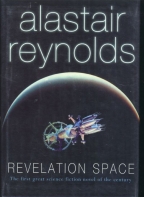 |
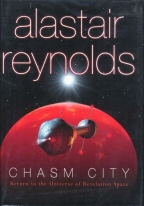 |
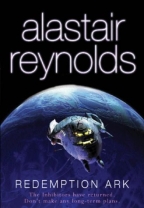 |
|
The first novel by Alastair Reynolds won him acclaim on both sides of the Atlantic. |
Reynolds set out to write a straightforward hard-boiled mystery about a detective pounding the mean streets in 'Chasm City'. |
'Redemption Ark' is a middle-of-the-series novel that doesn't suffer from the usual middle-of-the-series faults. |
Few writers are as devoted to reading satisfaction as Alastair Reynolds. This doesn't necessarily equate to pleasing all his readers. I have to admit that as much as I enjoyed 'Revelation Space', 'Chasm City' and 'Redemption Ark', I had little hope of soon seeing a clear resolution to the huge cosmic conflict the author had set up. It looked like it would be an enjoyable but long ride in a universe that was well designed to withstand lots of authorly exploration.
 |
|
I'm thinking that the the tagline of this novel is more than a hint about what we can expect to happen. |
But in 'Absolution Gap', Reynolds is planning to complete the story of the humans encounter with the Inhibitors. Minor -- but very enjoyable -- characters from the previous novels take a much larger role in this one. Reynolds promises that the novel will "piss off as many people as it pleases...and that's the way it should be". I wholeheartedly agree. In his first three novels, Reynolds has proved himself to be a top echelon writer of wonderfully weird science fiction. He writes intellectually stimulating fiction in evocative prose. No matter what the content, 'Absolution Gap' is certain to be a fine bit of written art. Readers can ask for nothing more.
 |
|
We're still catching up with the contents of this first edition hardcover of George Orwell's '1984', which you can now find shelved in the non-fiction section of the bookstore. |
It's going to be hard to top reality for all-out weirdness in the year 2003. This is the future we've built since 1970. No Pan Am Space shuttle for us; instead we have the Columbia Shuttle tragedy. There's no monolith on the moon; the monoliths came tumbling down when we were sucker-punched by our own technology. We have The Future Now. It's no wonder that alternate history plays such a big part in the science fiction genre; much of our recent history was the stuff of science fiction. We're living the future NOT written about by the first generations of science fiction writers. It hasn't played out as we planned it, as we hoped it, as the writers dreamed it. In some ways, we're still catching up with George Orwell's '1984' nearly 20 years after that date has passed. Still, writers continue dreaming and readers are still reading. The days of what was once our future may have passed. But today's future is every bit as illuminating as yesterday's future. Readers need to remember that these writers are not predicting the future. They're reacting to the past. Readers and writers are making the future, one day, one book, one word at a time. There's always plenty of future to read about. Reading is no passive activity -- 'to read' is a verb. At this moment, you, the reader are in the midst of the act of reading.
Thanks,
Rick Kleffel